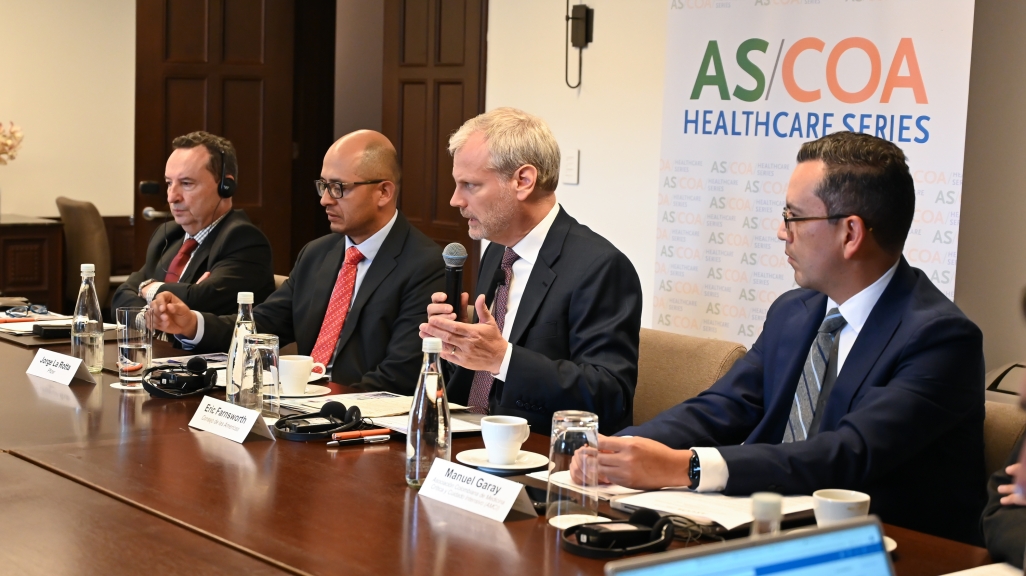Healthcare Roundtable: The Future of Covid-19 in Latin America and the Caribbean
Healthcare Roundtable: The Future of Covid-19 in Latin America and the Caribbean
At the in-person event in Bogotá, Colombia, participants discussed how to improve preparedness for future pandemics.
As part of the Healthcare Series, the Council of the Americas held a roundtable discussion on July 24 in Bogotá titled “Colombia: The future of Covid-19 in Latin America and the Caribbean,” as part of a series of roundtables focused on developing solutions for Covid-19 and improving preparedness and the response to future pandemics.
For this edition, the roundtable convened policymakers, government representatives, scientific associations, academia, and thought leaders to discuss the lessons learned over the past three years and develop strategies to be adopted by governments going forward.
In the Colombian context, there is an urgent need to include pandemic preparedness as a key priority in the country's public health agenda and to incorporate measures that focus on the prevention, diagnosis, and treatment of infectious disease. Likewise, participants stressed that to maintain an adequate response, it is necessary for the actions and strategies adopted in the last three years to be capitalized on and consolidated—not only in the face of new emergencies but also as the country continues to navigate current public health challenges.
- Read a press release about the event in English. And in Spanish.
In his opening remarks, moderator Eric Farnsworth, vice president of COA, stated that “despite the recent announcement by the World Health Organization declaring an end to the global public health emergency of the Covid-19 pandemic, it is crucial that countries remain vigilant in terms of preventing a recurrence of the virus, be ready for the next pandemic, and make sure that high-risk patients are fully cared for and fully prioritized in this battle of safe and safety.”
Roundtable participants evaluated the lessons learned from the past three years, shared their experiences navigating the pandemic from their different roles, and offered recommendations for the Colombian government to take into consideration moving forward. Among the priorities that participants recommend policymakers to consider incorporating into the Colombian health system are:
- Regulations: Participants stressed the importance of developing mechanisms that fast-track regulatory clearance for innovations. As countries experience a transition phase following the announcement by the WHO, it is important for the Colombian government to clarify if the emergency-use authorization mechanism will remain in place or if it will be repealed. If the latter is true, what transition mechanisms will be implemented? In addition, participants suggested promoting a regulatory toolbox to find mechanisms to make the entry of new technologies somewhat more flexible with the necessary support from other government institutions to ensure that these technologies are safe and effective. The innovation strategies that were seen during the pandemic should continue.
- Medical Shortages: Participants reflected on the difficulties that they encountered due to coordination and communication problems among the various parts of the public health apparatus. Additionally, participants suggested that the government should establish mechanisms that ensure adequate and effective communication between public hospitals, laboratories, and medical distributors. One of the recommended mechanisms was the establishment of public-private partnerships to improve the country's technical capacity and leverage the expertise of multinational companies to locally produce medicines, vaccines, and diagnostic technologies in Colombia to strengthen the local technical capacity and availability.
- Epidemiology surveillance: There is a need to update the country’s public health surveillance system. At the beginning of the pandemic, there was no immediate response system established that defined the quantity of medical personnel. Therefore, there were territorial entities without surveillance personnel or epidemiologists trained to deal with the virus. Likewise, a primary care training must be required for all medical health personnel. Pharmacological management system must be established so that the staging of the patient is adequate, both in terms of diagnosis and treatment.
- Education: Continuous education of medical personnel about viral infections, such as Covid-19, and the importance of vaccination is key. Participants stated that constant capacity building will help to break cycles of misinformation and fear among health care providers and the community. Consequently, people will rely more on the prevention campaigns and trust vaccination. Finally, participants suggested reviewing the public health plan to include a budget that focuses on creating and promoting targeted prevention campaigns about contagious diseases as an effective way to overcome fears, especially among older adults. This group is the population with lowest percentage of vaccination coverage and higher rates of risk of contagion and death.









